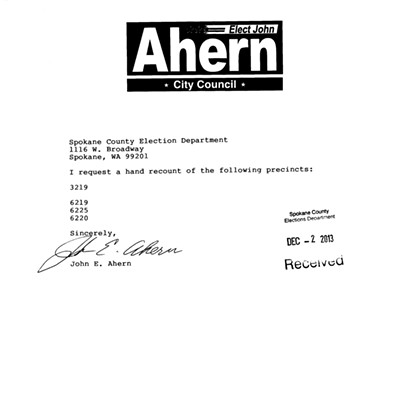
East Valley School District parent Stacy Montoya pounds the podium, delivering a sermon lambasting the board and superintendent for their transition away from the middle school system.
“I am sorry, but I cannot wait for this next election, because I will speak my mind with my vote,” Montoya says. “I cannot sell upper-end homes in this market anymore. Do you know that? ... If you think this is a good plan, then vote for these people again.”
Superintendent John Glenewinkel, a big, brawny man with a full beard speckled with white, peers over his glasses, scrawling on paper. He isn’t writing notes. Instead, he’s sketching — diamonds and squares and circles, with lines and patterns inside them.
“It’s called graphotherapy,” Glenewinkel says after a snapshot of his doodles ended up on East Valley’s Citizens for Accountable Education Facebook page. “What it allows me to do — it allows me to focus on the comments without becoming emotionally involved in the personal attacks.”
It’s not unusual for a group of community activists to tirelessly target one aspect of a district: In Spokane, it was the math curriculum; in Coeur d’Alene, it was the International Baccalaureate program. But in East Valley, the outcry has focused around the decision to extend elementary schools from kindergarten through the eighth grade, eliminating separate middle schools.
And though he wasn’t the one who initially proposed it, Glenewinkel led the way forward on the change, he’s defended it, and he’s become the target for its tireless critics.
“It’s been a lot of sleepless nights,” Glenewinkel says. “I’ve ground my teeth to nubs. I’ve spent long hours [meeting] with people who are personally invested in helping me fail.”
He argued that the district needed a “seismic change” to rock the status quo. East Valley got that. But as the aftershocks are still reverberating, the upcoming school board election could determine whether the changes last.
If there’s a symbol of the district’s abandonment of traditional middle schools, it can be found at Mountain View Middle School, where windows have been boarded up with plywood in an attempt to stop vandals. But if there’s a symbol of the challenge of that transition, it could be found in the number of students from East Farms STEAM Magnet School who still take band, orchestra and gym classes in that boarded-up building.
Tammy Fuller, principal at East Farms, says it was a way to let students use the middle school’s quality facilities and reduce crowding. Glenewinkel says the district could have kept the building closed to “avoid any political fallout,” but chose to use what was best for students.
But to critics of the transition to K-8, the boarded-up windows represent an outrage. “The district has absolutely pushed full steam ahead into implementing a system that our district does not have an infrastructure to do,” parent Mindy Stewart says.
She also laments how East Farms lacked lockers, forcing middle-grade students to carry heavy bags from class to class. Fuller says that’s the one complaint she heard from students.
“They’ve wanted lockers for three years,” Fuller says. “Lockers are lovely.” If the recent bond proposal had passed, Fuller says, she’s absolutely confident that lockers could have been installed. But many opponents of K-8 campaigned against it, and it failed miserably.
Nationally, the evidence over K-8 has been inconclusive. Some studies suggest it benefits students by eliminating the academically risky transition from elementary to middle school; others found no significant difference. But in East Valley, the setup is a unique hybrid, an attempt to capture the best of both worlds.
As students approach the middle grades, they start taking classes from separate teachers, like they would in middle school. On Mondays, eighth graders and some seventh graders are bused over to the old East Valley Middle School building, where they take electives.
Many of the critics’ dire predictions haven’t come true. There hasn’t been a spike in behavioral problems. There hasn’t been a mass exodus from the district. Glenewinkel says he expected standardized test scores to dip initially. Instead, with a few exceptions, he says they’ve increased.
“If K-8 didn’t work, we wouldn’t see an increase in our graduation rate, we wouldn’t see an increase in the number of kids who are completing college courses, we wouldn’t see increased attendance, we wouldn’t have seen decreased discipline [problems],” Glenewinkel says.
His critics counter that the kids graduating at increased rates never experienced the K-8 system. Glenewinkel says that misses the point of the change, which was to wake up the entire district, shaking it free from mediocrity. Glenewinkel says he’s seen the entire district, at all age levels, transform.
“The feel of the schools is different,” Glenewinkel says. “The schools feel calm, they feel like communities.”
While the current board has been unanimous in its votes to move to do away with middle school, that could all change this November. East Valley’s long, hard journey over the past few years could be completely reversed. With three positions up for grabs, the two incumbents are the only candidates supportive of the K-8 transition. The rest fall between skepticism over the process and outright antagonism over the changes.
At least one change on the board is guaranteed. The two new candidates in District 5, Mike Novakovich and Deanna Ervin, have nearly identical positions on K-8. They aren’t necessarily opposed to the idea behind the change, but believe the implementation has been a disaster and would support carefully returning to traditional middle schools.
Glenewinkel, for his part, chuckles when asked what he hopes to bring to the district in the next three years. “As much as I want to be here, I’m pretty realistic that the odds of me being here three more years are pretty slim,” he says. “Any time you have a board that turns over, then the superintendent is at risk. … [But] overall, the work I’ve done here has been pretty powerful.”

























